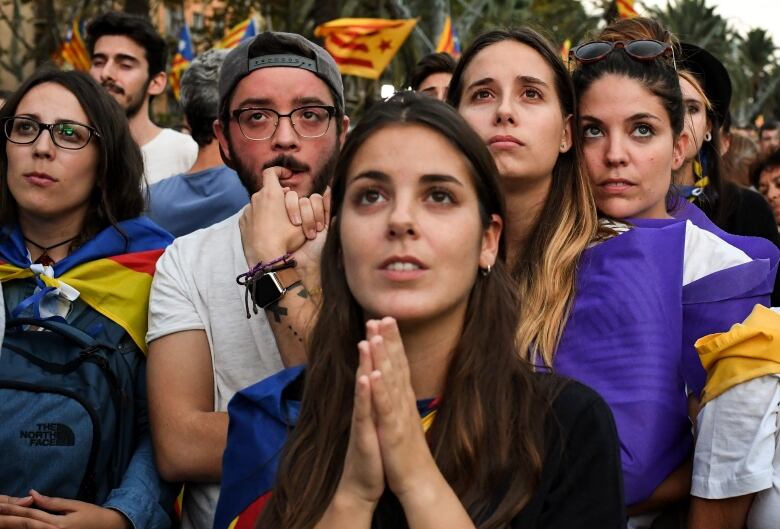Spain snubs Catalonia's call for talks on independence
Regional president failed to deliver 'yes or no' answer on break with Madrid, deputy PM says

The Spanish government moved closer to imposing direct rule over Catalonia on Mondayafter the leader of the autonomous region failed to clairfy,to Madrid's satisfaction,his stance on independence.
In a letter delivered two hours before Monday's deadline, Catalan regional PresidentCarlesPuigdemontcalled for talks with Spain's central government but,according to Spain's deputy prime minister, didn't say whether a speech he delivered after the region's recent referendum should be considered a formal break from Madrid.
The letter instead called for negotiations over the next two months.
The government wanted a simple "yesor no," Soraya Saenz de Santamaria told reporters.
- CBC IN BARCELONA |In Catalonia, 2 intractable sides battle for hearts and minds
- Spain demands clarity on Catalonia's bid for independence
"That was the question that was asked and the response shouldn't be complicated," he said.
SaenzdeSantamariasaid Puigdemonthas until Thursday morning to fall in line, or facethe possibility of Spain activating Article 155 of the Constitution thatwould allow the central government to take over parts of the eastern region's self-governance.
The country is facing its worst political crisis since an attempted military coup in 1981 after Catalan voters backed independence in an Oct. 1 referendum,whichSpain's constitutional court said was illegal.
In a speech delivered days later,Puigdemontsaid he had a mandate for independence but was suspending secession "for a few weeks" to pursue talks with the central government.
Broader concerns?
The Catalan government says 90 per cent of voters in the referendum backed a breakaway, but turnout was only 43 per cent as most opponents of independence in the region boycotted it.
While that points to a lukewarm endorsement of Puigdemont's intentions, European Union authorities remain concerned that the deepening impasse between Madrid and Barcelona may impel moves towards secession elsewhere in the bloc.
European Commission President Jean Claude Juncker last week said Catalan independence would encourage other regions to follow suit, potentially making the European Union ungovernable, while investors believe a split could curb and eventually derail an economic rebound.
The terms of Article 155 on direct rule, which has never been applied, are vague.

It says that when a region does not meet its constitutional obligations or other laws, or goes against the general interest, the government "can adopt any measure needed to force those obligations to be met" once receiving approval from Spain's lower house.
The article's wording suggests that would include anything from taking control of the regional police and finances to installing a new governing team or calling a snap election.
Catalan police chief Josep Lluis Trapero appeared before Spain's High Court on Monday to be questioned over whether his force, the Mossos d'Esquadra, deliberately failed to enforce the court ban on the independence referendum.
Trapero has been put under formal investigation for sedition after failing to order to rescue Civil Guard police who were trapped inside a Catalan government building in Barcelona by tens of thousands of pro-independence protesters.
The heads of civic groups Asamblea Nacional Catalana and Omnium will also testify over their role in organizing those protests.
With files from The Associated Press












_(720p).jpg)


 OFFICIAL HD MUSIC VIDEO.jpg)
.jpg)



























































































